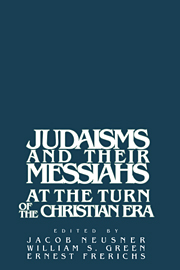Book contents
- Frontmatter
- Contents
- Preface
- List of Contributors
- 1 Introduction: Messiah in Judaism: Rethinking the Question
- 2 Wisdom Makes a Difference: Alternatives to “Messianic” Configurations
- 3 Salvation without and with a Messiah: Developing Beliefs in Writings Ascribed to Enoch
- 4 How the Authors of 1 and 2 Maccabees Treated the “Messianic” Promises
- 5 Messianism in the Maccabean Period
- 6 Waiting for the Messiah: The Spiritual Universe of the Qumran Covenanters
- 7 Philo and Messiah
- 8 Messiah and Gospel
- 9 Christology in Mark's Gospel
- 10 The Question of the Messiah in 4 Ezra
- 11 From Jewish Messianology to Christian Christology: Some Caveats and Perspectives
- 12 Mishnah and Messiah
- General Index
- Index to Biblical and Hermeneutical Texts
10 - The Question of the Messiah in 4 Ezra
Published online by Cambridge University Press: 08 January 2010
- Frontmatter
- Contents
- Preface
- List of Contributors
- 1 Introduction: Messiah in Judaism: Rethinking the Question
- 2 Wisdom Makes a Difference: Alternatives to “Messianic” Configurations
- 3 Salvation without and with a Messiah: Developing Beliefs in Writings Ascribed to Enoch
- 4 How the Authors of 1 and 2 Maccabees Treated the “Messianic” Promises
- 5 Messianism in the Maccabean Period
- 6 Waiting for the Messiah: The Spiritual Universe of the Qumran Covenanters
- 7 Philo and Messiah
- 8 Messiah and Gospel
- 9 Christology in Mark's Gospel
- 10 The Question of the Messiah in 4 Ezra
- 11 From Jewish Messianology to Christian Christology: Some Caveats and Perspectives
- 12 Mishnah and Messiah
- General Index
- Index to Biblical and Hermeneutical Texts
Summary
The agenda for this volume was set by J. Neusner in a number of communications over the past few years. He puts it in a statement of 7 November, 1982:
The organizing category is the social group, its world-view and way of life (“Judaism”) and the uses and conceptions of the figure of the Messiah within that social group's world-view. The essential issue is the larger conception of Israel's history and destiny expressed within, and by, the group's version of the Messiah-myth (or: expressed without reference at all to that myth).
In what follows I have attempted to look at the way the Messiah is presented in one apocryphal apocalypse, and rather than stressing the detailed analysis of the actual information offered about the Messiah, I have attempted to clarify why Neusner's agenda is very difficult to follow in this case. There is, I think, a good deal to be learnt from that difficulty.
The issue we wish to investigate is how the view of the Messiah in 4 Ezra is related to the way that the community responsible for 4 Ezra sees itself. In order to do this, a number of different questions must be approached.
What does 4 Ezra say about the Messiah?
From a broader perspective, what role do ideas of redemption play within the thought structure and religious dynamic of the book? How do his views of Messiah function within this context?
[…]
- Type
- Chapter
- Information
- Judaisms and their Messiahs at the Turn of the Christian Era , pp. 209 - 224Publisher: Cambridge University PressPrint publication year: 1988
- 4
- Cited by

